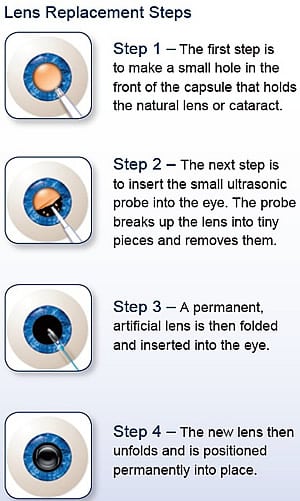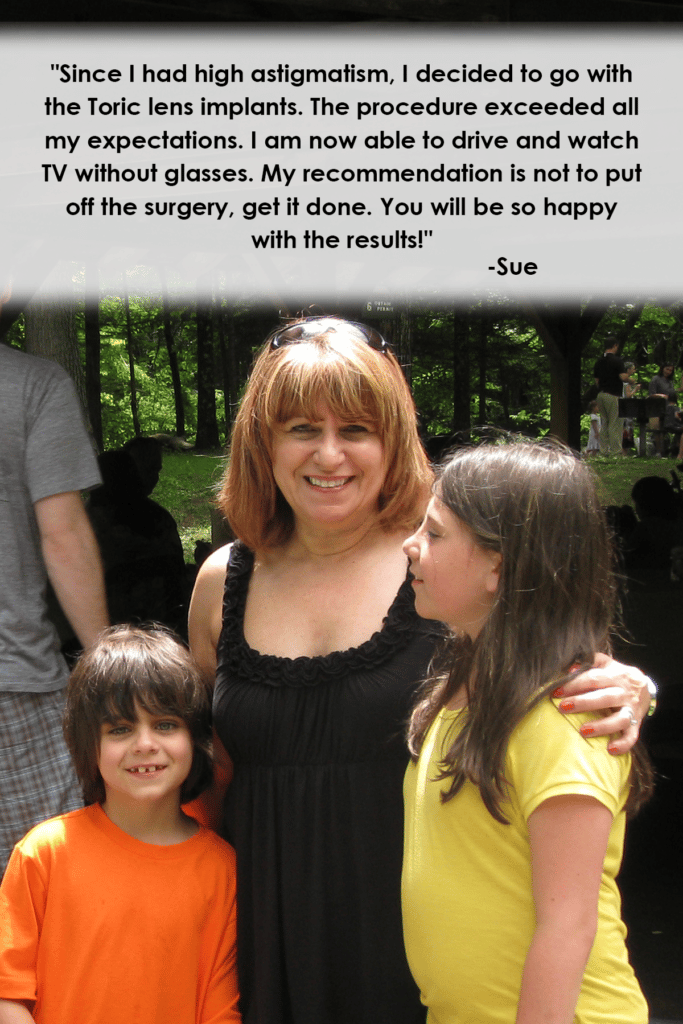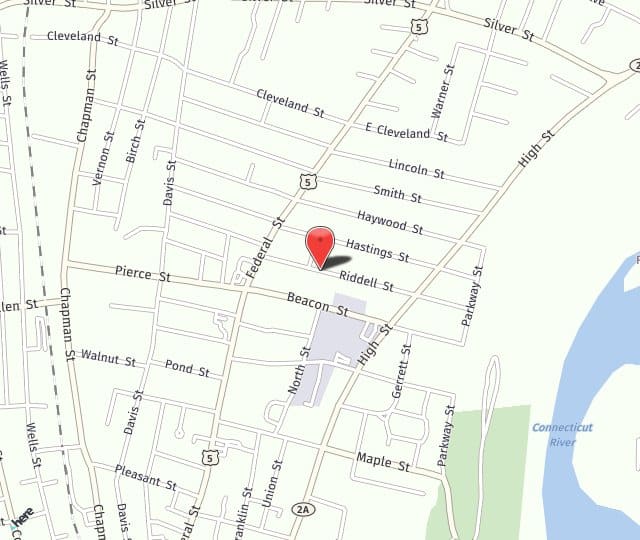
What Is a Cataract?
The term cataracts refers to the eye’s natural lens. Clear at birth, the lens becomes cloudy over time, causing vision problems and can eventually cause blindness if left untreated. Cataracts are completely normal and typically develop sometime in our 50s or 60s. Surgery is the only treatment for a cataract. You should consider surgery when cataracts cause enough loss of vision to interfere with your daily activities.
Can Cataracts Be Prevented?
Most cataracts occur with age. However, a good, balanced diet, protection from the sun, and restraint from smoking can delay the development of cataracts.
What Are My Treatment Options?
Cataract Surgery (Removal)
Cataract surgery is a routine, virtually painless outpatient procedure that replaces your clouded lens with a clear intraocular lens implant. Cataract removal is performed through a procedure called phacoemulsification. In this procedure, high-energy ultrasound waves are used to gently remove your cataract. In most cases, we use only eye drop anesthesia, allowing our patients the fastest possible recovery. Once the cataract is removed, a permanent, artificial lens is inserted. It is not uncommon for our patients to have the benefit of dramatically improved vision within a few hours of their procedure.
Clear Lens Exchange
For those with presbyopia that are not yet candidates for cataract removal, your surgeon may offer an elective procedure known as clear lens exchange. This procedure uses the same successful techniques as modern cataract surgery by replacing your natural lens with an intraocular lens (IOL) designed to reduce or eliminate your need for readers, bifocals or even trifocals.
Results After Cataract Treatment
I’ve been in business and observed interactions between customers and employees my whole life. I cannot say enough about how impressed and pleased I was with my entire experience with Longwood Eye & LASIK Center. From the first phone call to set up the appointment, to the time Dr. Warren spent with me before and after my surgery, and all of my pre and post-operative appointments, it was a truly a pleasant experience!
Three of my friends had similar cataract procedures, and prior to my conversation with them, I had no idea that this type of procedure was available. It is totally remarkable how I feel and how my vision has improved without the use of contact lenses. Simply put, my results are outstanding and I have never experienced this level of professionalism and care, and I wholeheartedly recommend Dr. Warren and his team at Longwood Eye & LASIK Center.
-Michael M – Cataract Surgery with John Warren, MD
Which Lens Is Best for Me?
Distance Correcting Monofocal IOLs
Traditionally, the lens implant used for cataract surgery is a monofocal IOL. In most cases, the monofocal lens provides good distance vision for driving, walking, and some everyday activities. However, most people receiving monofocal lenses still require reading glasses or bifocals to have a full range of vision.
- Traditional
- Advanced
Astigmatism Correcting IOLs
Approximately 20% of cataract surgery patients have a significant degree of astigmatism. Astigmatism creates distortion in vision and is not corrected by traditional cataract or lens replacement surgery. The unique design of the Toric IOL makes it possible to provide quality distance vision and reduce or eliminate astigmatism at the same time.
- Clareon TORIC
- Tecnis TORIC
- enVista TORIC
Enhanced vision option
This option combines the optics of advanced wavefront-designed monofocal IOL with modern surgical planning and techniques to provide a higher quality and overall enhanced vision with a monofocal designed IOL. These techniques will also further reduce or eliminate your need for distance glasses including low levels of pre-existing astigmatism. In a clinical study, these more advanced optics provided improved visibility, better contrast sensitivity, and reduced glare.
Vision correction decisions are among the most important you will ever make. There are many intraocular lens (IOL) options available, including traditional monofocal, advanced monofocal, toric and multifocal, IOLs. Your doctor will discuss all the options available and recommend the IOL that is best for you.
Presbyopic Correcting IOLs
Previous lens replacement technologies provided only one improved focal point, distance, leaving people dependent on readers or bifocals after cataract surgery. Furthermore, in the past, those who were not yet cataract surgery candidates had no good alternatives to readers, bifocals, or trifocals. Recent advances in lens technology now make it possible to improve vision at all ranges, near through distance, with increased freedom from glasses or contact lenses. Our doctors are proud to offer the most advanced multifocal IOLs to give our patients the best possible vision.
- Tecnis Synergy Multifocal
- Clareon PanOptix Multifocal
What Are the Risks Associated with Lens Replacement Surgery?
As with any surgical procedure, there are risks involved. These may include infection, retinal detachment, an increase in eye pressure, reactions to medications, and vision changes. Our doctors will discuss all risks and benefits with you before your surgery.
Are There Any Side Effects?
Common side effects include redness, scratchiness, and light sensitivity. You may also experience glare, halos around lights, and blurred vision. These side effects may make it more difficult to see while driving at night or working in low light for a period of time, however they generally resolve over time.
How Long Does the Procedure Take?
Cataract surgery is generally a simple, outpatient procedure requiring only a few hours of your time. Patients should plan on being at the surgery center for about 2-3 hours.
Where Will My Surgery Be Performed?
Your lens replacement procedure will be performed by one of our surgeons in an outpatient surgery center or hospital facility.
What Can I Expect After My Surgery?
After a short stay in the outpatient recovery area, you will be ready to go home. Plan to have someone drive you home. Everyone heals differently, but most patients can return to their normal activities the very next day. You will return to our office for a postoperative visit the next day. You will notice an improvement in your vision at that time which will continue to sharpen over the next 30 days. Eye drops will be prescribed to prevent infection and help your eye to heal.
How Will I See After Cataract Surgery?
Once the cloudy lens is removed, you will see a dramatic improvement in the clarity of your vision. Colors will be brighter, more vivid. And advanced lens implants, such as Tecnis, ReSTOR, and Crystalens, can deliver vision that is uniquely suited to your lifestyle. Dr. Warren and Dr. Fay will talk with you to understand your vision needs and can recommend a lens implant that gives you a fuller range of vision, allowing you to spend most of your day without glasses.
Will I Need to Wear Glasses After My Cataract Surgery?
During traditional cataract surgery, a single focus lens is implanted. Often times this gives patients good distance vision but still requires them to wear reading glasses for near vision. However, we offer our patients the option for a multifocal or accommodating lens implant that may allow them good vision at any distance, near through far.
Schedule a Consultation
If you are interested in learning more about cataract surgery and would like to see if you are a good candidate, please call 1-855-286-2020 or request a consultation online.
Testimonials
The staff at the Greenfield office are simply awesome. They exhibit extremely high levels of professionalism, caring, knowledge and efficiency. Dr. Lotufo is an excellent practitioner and I'm glad I have him for my treatments and care. He is thorough and direct and explains the issues and treatments in an understandable manner. I know I'm in good hands with the Greenfield Staff and Dr. Lotufo. Thank you to all. I hope the staff and Dr. Lotufo get to read this review and it doesn't just get put into some survey file. Regards, Richard WDecember 13, 2024
For the past several years, since first being referred to Dr Ying (Howard Ying, MD, PhD) for urgent specialty care, I have consistently received excellent care from all medical personnel & staff that I have interacted with during my appointments at the Longwood Eye Care offices (in both Greenfield & Gardner).June 06, 2025
The staff at Longwood in Fitchburg as well as Dr Fay are very polite and very professional and caring just want to say you guys are the best, thank you.June 05, 2025
I had an amazing experience with Longwood Eye & LASIK! They quickly set up an appointment for me and booked my surgery in the same week. I needed this done for the State Police. Such amazing staff and so helpful! My recovery has been so smooth. I recommend this place to anyone who is in need of quick and good quality LASIK surgery. Thank you everyone Dr.’s and staff for your amazing hospitality and professionalism.June 05, 2025
My wife recently had bilateral cataract surgery, done by Dr. Warren, and I had a comprehensive exam with Dr. Maher. Since I am a retired optometrist, I can definitely talk about this practice. The support staff are excellent; the office people are friendly, most competent and professional. Lovely ladies, all of them. The technicians are the same: professional, very nice, skilled, and didn't rush you along. Every doctor we encountered took the time to do a proper workup and answered all our questions. Dr. Warren is a very good surgeon. He explains everything. He even asked me if I wanted to come work there! I would if my health was better. My wife can finally see straight. She had no post-surgical complications. Dr. Maher got me all set with an updated prescription for glasses, did a thorough exam which reminded me of my work before my health faltered. We had the chance to talk awhile, which was nice, finding out how other optometrists are getting along. This is such a wonderful office, if my health improves I just might ask about seeing patients part-time. I loved managing glaucoma and dry eye, and their practice is the perfect setting for helping such patients preserve their vision.June 03, 2025
My wife recently had bilateral cataract surgery, done by Dr. Warren, and I had a comprehensive exam with Dr. Maher. Since I am a retired optometrist, I can definitely talk about this practice. The support staff are excellent; the office people are friendly, most competent and professional. Lovely ladies, all of them. The technicians are the same: professional, very nice, skilled, and didn't rush you along. Every doctor we encountered took the time to do a proper workup and answered all our questions. Dr. Warren is a very good surgeon. He explains everything. He even asked me if I wanted to come work there! I would if my health was better. My wife can finally see straight. She had no post-surgical complications. Dr. Maher got me all set with an updated prescription for glasses, did a thorough exam which reminded me of my work before my health faltered. We had the chance to talk awhile, which was nice, finding out how other optometrists are getting along. This is such a wonderful office, if my health improves I just might ask about seeing patients part-time. I loved managing glaucoma and dry eye, and their practice is the perfect setting for helping such patients preserve their vision.June 03, 2025
I needed an appointment asap and they got me right in that day . I wasn’t even a patient of theirs ! From the girls behind the desk ( they were awesome) to the nurses and Dr. Provost, everyone made me feel very comfortable. All in all , very knowledgeable and helpful staff ! 5 stars to all of you 👀May 26, 2025
My experience with Longwood Eye & LASIK was 5 ⭐️. Shout out to Dr Warren, my eye surgeon, to my follow up visits with Dr Walkowiak and Dr Benoit, Great team of physicians, thank youMay 16, 2025
Dr Adam Provost was patient to answer my questions. I had ruled out ever wearing contacts again but he took the time to explore options with me.May 16, 2025
I never leave reviews, but I had such a good experience that I feel like I need to. I was traveling from out of town and got a very bad eye infection. I called so many ophthalmology offices and nobody would see me. I finally called Longwood Eye and LASIK. They squeezed me in because they knew I was worried about my eye. The clinic is clean and well organized. The entire staff was very professional and friendly. They have the latest equipment. Dr. Benoit is a great doctor with a wonderful bedside manner. I get very nervous about my eyes. He was very gentle and calm and reassured me everything would be okay. I’m so grateful to him and the eye center for taking care of me do I could continue my travels with no worries.May 16, 2025
1 2 3 … 40 Older Testimonials →






